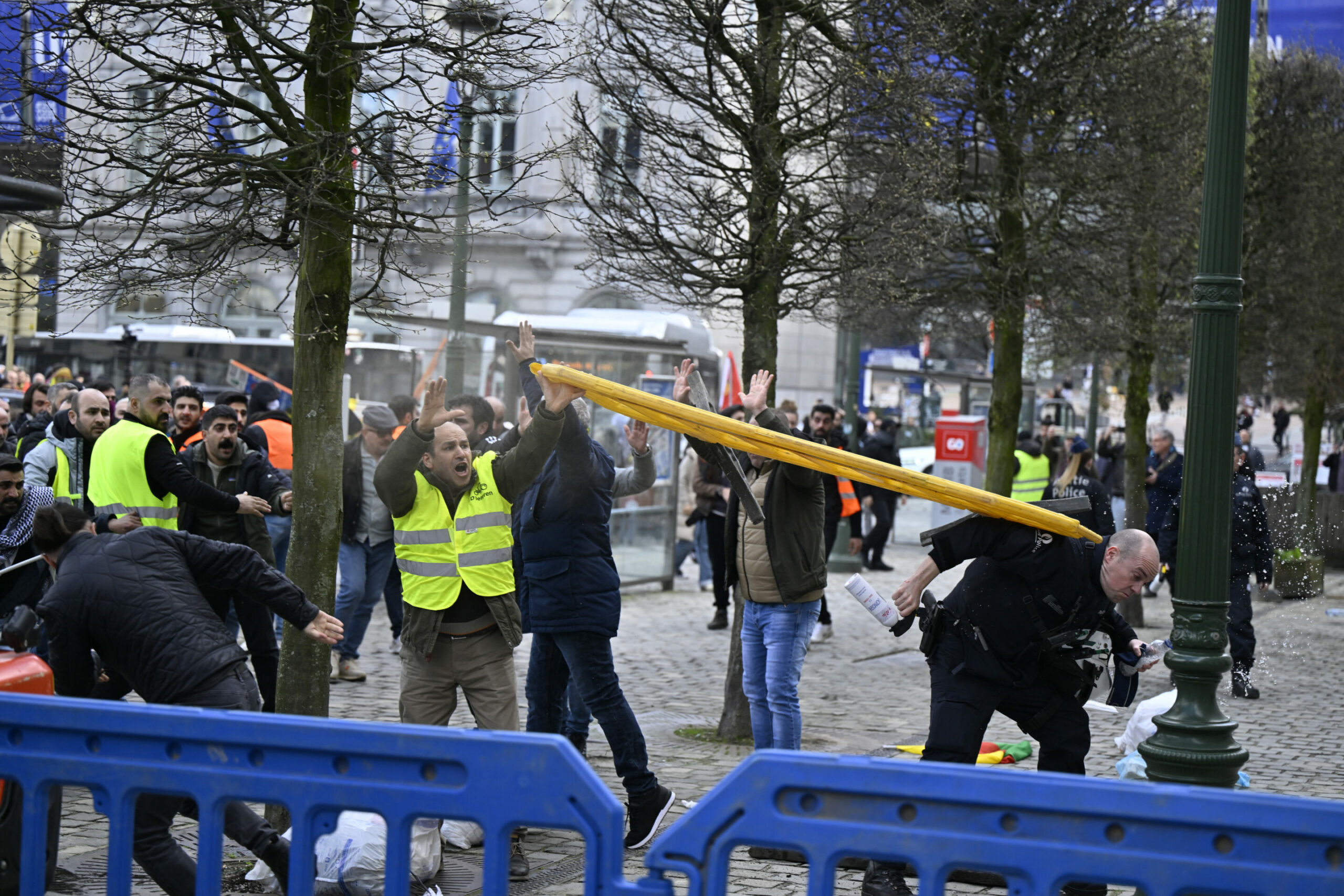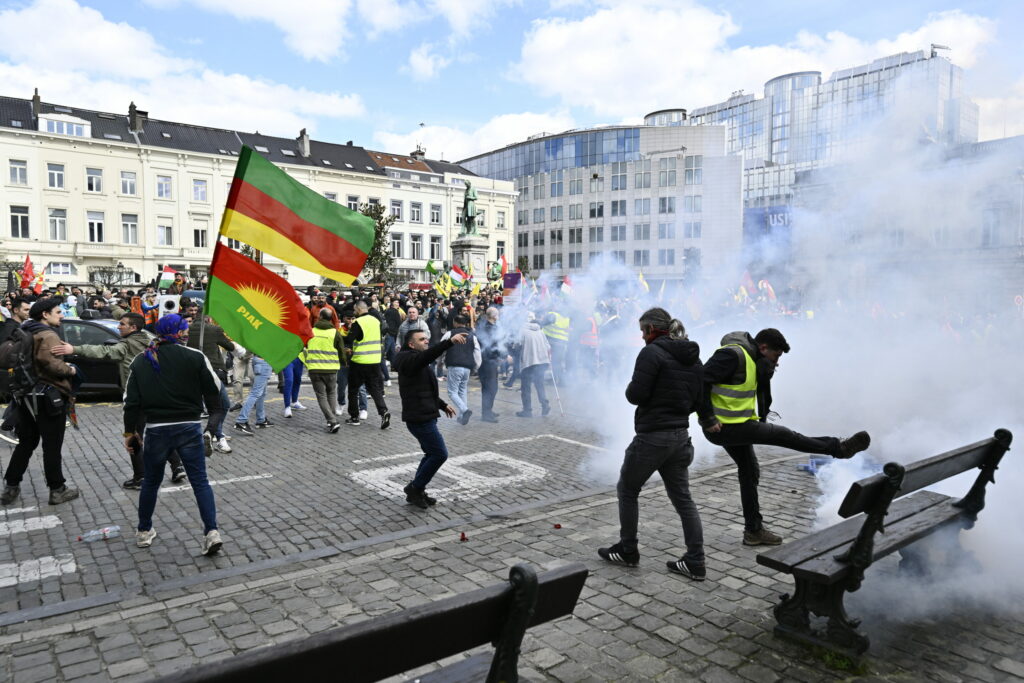From Liège to Limburg, Ghent to Brussels, members of the Turkish and Kurdish diaspora in Belgium have been embroiled in a series of violent confrontations over the last few days which has taken the country by surprise.
Six people were injured on Sunday after a family of Kurds who had celebrated Nowruz – the start of the Persian New Year – were attacked in Heusden-Zolder and Houthalen-Helchteren. But there are conflicting versions of the story.
A statement from the Council of Kurdish Communities in Belgium (NavBel) stated that the victims were a family of Syrian Kurdish refugees who were peacefully making their way back home from the Nowruz event which hosted up to 5,000 Kurds from all over north-western Europe.
The local police chief in Genk, however, said there had been a provocation by certain Kurdish groups, who were waving flags while driving in areas known to have large Turkish diasporas.
"They started provoking the Turkish population with flags," said police chief Geert Verheyen. "This led to an incident in which a young man of Turkish origin asked the caravan why it was necessary to drive the streets with flags of PKK. He then received several punches."
One video shows a mob in Houthalen-Helchteren chasing a car, which VRT reported, had "provoked" the crowd by giving a hand gesture associated with the PKK – a militant Kurdish nationalist movement which has been designated as a terrorist group by the European Union and the United States (but not Belgium).
In one video, a car is seen driving away as a large mob chases it. The crowd reportedly later caught up with the car and beat up those inside – with some having been hospitalised. Later that evening, police in Limburg were called out to the nearby Heusden-Zolder, where a house full of people of Kurdish origin was targeted by a mob of around one hundred Turks.
The Turkish Embassy in Belgium has accused PKK supporters of being behind the violence. "PKK militants gathered in Leuven, Belgium, carried out attacks targeting Turkish citizens living in the cities of Heusden-Zolder and Houthalen," stated the embassy. "These incidents once again prove that the PKK terrorist organisation is a threat to social peace and public order in Western Europe."
"Families peacefully returning home after the spring festival were attacked by Turks for having Kurdish flags in the car," said one of the organisers Arife Soysuren to Belga News Agency. "It is almost certain that the attack was planned. It is impossible to mobilise 100 men in ten minutes."
According to NavBel, the family and their neighbours called the police and their friends for help as they were "completely terrorised". The Kurds who arrived for help were confronted by ultranationalists.
Sunday's Limburg violence against the Syrian-Kurdish family mobilised the Kurdish community in Brussels, who organised a protest at Place du Luxembourg on Monday. This event too descended into street fighting, after a small minority provoked Kurdish demonstrators.
Organisers of the demonstration have laid the blame for uptick in the violence on the Grey Wolves, a neofascist youth group which enjoys support from Turkish diasporas in Belgium, the Netherlands and Germany. They were banned in France in 2020, and back in Turkey the senior wing is part of Turkish President Recep Tayyip Erdoğan's ruling coalition.
The far-right group opposes the assimilation of the Turkish diaspora into European culture, and are behind a series of fanatical ultra-nationalist stunts and acts of vandalism. It is believed to have links to the non-profit Turkish Federation of Belgium (Belçika Türk Federasyonu) – and one of its chapters in Eisden, Maasmechelen, was targeted on Tuesday night, when suspected PKK supporters smashed the windows of the site with a brick.

Tensions rise at a protest action by the Kurdish community after the Sunday afternoon and evening riots in Heusden-Zolder, in Brussels, Monday 25 March 2024. Credit: Belga / Eric Lalmand
The violence spread into Flanders and Wallonia in a spate of retaliation acts. In Ghent, another incident saw ten masked individuals breaking windows and entering a café owned by a Kurdish community member, with video footage showing some members giving the rallying symbol of the Grey Wolves, the Belga News Agency reported.
In Liège, several dozen people attacked a Turkish café in Cheratte on Monday evening with baseball bats and Molotov cocktails. A number of cars were also vandalised.
Kurdish statehood claims
Given the two communities' history, this is far from the first episode of violence which has erupted between the two.
The origins lie in ethnic Kurdish claims for an independent state – which have been ongoing since the times of the Ottoman Empire. When the empire fell in 1923, the Kurdish region was split among the newly established nations of Turkey, Iraq, Iran and Syria. Kurds in Turkey form the largest group.
Since the 1980s, the PKK have taken up arms against the Turkish Republic, with many seeing the movement as a national liberation struggle, while others condemn the use of terrorist attacks against civilians. After years of insurgency, a two-and-a-half-year ceasefire collapsed in July 2015, with the PKK resuming its armed struggle.
Contrary to the Turkish Government's claims, not every person in the Kurdish community supports the PKK. A Metropoll survey in 2020 found that 29% of Kurds would even vote for President Erdoğan ruling AKB party.
But since coming to power, Erdoğan has increased his nationalistic rhetoric against Kurds, playing on public anger over terror attacks perpetrated by the PKK in Turkey.
Turkey maintains that Kurdish people enjoy the same political rights as others, yet human rights organisations have accused the Turkish President of not distinguishing between the PKK and supporters of the mainstream democratic Kurdish political parties.
A US State Department report from 2020 stated that "nearly all private Kurdish-language newspapers, television channels, and radio stations remained closed on national security grounds under government decrees," with frequent arrests of journalists and continued judicial pressure on Kurdish media.
The Turkish President has even personally weighed into the debacle in Belgium, having personally called on Tuesday one of the victims of the violence, reported the state-run Turkish media, Anadolu Agency.
"These people are immoral, despicable and villainous. The official authorities on site and our embassy are following the case. I hope that the outcome will be favourable," said Erdoğan to the 16-year-old Belgian-Turk allegedly beaten up by PKK supporters in Brussels.
Calls for calm in Belgium
Leaders of both communities in Belgium have called for calm, with Prime Minister Alexander De Croo also calling for an end to the violence on Wednesday.
"Freedom of opinion is guaranteed in Belgium, but expressions in favour of a terrorist organisation like the PKK will not be tolerated," De Croo stated following a National Security Council meeting on Wednesday morning.
Since the outbreak of the violence, some 40 politicians of Turkish origin, mainly from Limburg, also launched an appeal for calm. Hilal Yalçin, a Flemish CD&V MP and councillor in Beringen recalled that the Turkish and Kurdish communities have lived together peacefully for decades.
The Council of Kurdish Communities in Belgium also called for calm on Tuesday evening. "Many provocative incidents have unfortunately occurred," which the organisation deplored. "We call on our community to act only within a legal, humane and peaceful framework. We reject anything that does not fall within this framework. Belgian laws must be respected."
On Tuesday, Ghent Mayor Mathias De Clercq (Open VLD) met representatives of the local Turkish and Kurdish communities to outline the joint responsibility of mosques, parents, and community leaders to urge restraint and caution against reacting to provocations, stating that "violence and retribution are never the solution."

